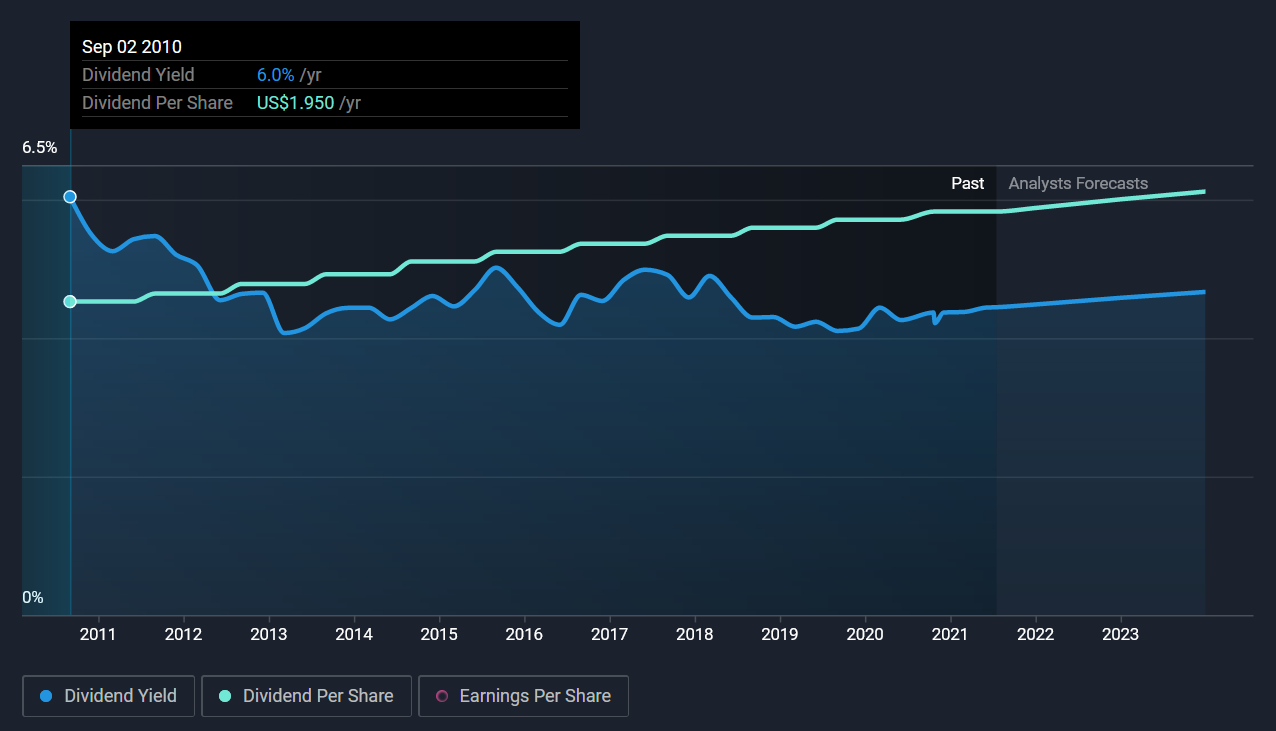Buffett is Buying Verizon Communications (NYSE: VZ) for its Stable Dividend

Verizon Communications Inc. ( NYSE: VZ ) gets a lot of attention from institutional investors.
For Q1 2021, Berkshire Hathaway ( NYSE: BRK.A ) revealed a position of 146,716,496 shares - a stake valued at US$ 8.22b at the current price.
Ultimately, Verizon is a mature company that fits the mature investors’ expectations — slow and continued growth with solid yields, as evident from the interest that it gets from Buffett.
Recent Developments
Looking at the recent stock movement, even the volatility of 2020 didn’t make a significant impact on the price. As the price has been stuck in a $50-$60 range for over 2 years.
Meanwhile, the company has been working on expansions, recently announcing an acquisition of Senion - a global leader in location-responsive solutions. The indoor location market is one of the latest booms as it solves the navigation problems in 3D space - something that the global positioning system (GPS) struggles at.
There are broad applications for this technology. From retail stores, warehouse operations, to emergency response services, Verizon is well-positioned to leverage its size to succeed in this field.
Furthermore, after selling the media business (with brands like Yahoo and AOL), Verizon freed up over US$ 5b to use in launching the 5G Ultra Network and grow its core business.
With Verizon Communications yielding 4.5% and having a 14-year history of dividend growth, it would not be a surprise to discover that many investors buy it for dividends. When buying stocks for their dividends, there are few factors to consider whether these dividend payouts are sustainable.
Click the interactive chart for our full dividend analysis

Payout ratios
Dividends are usually paid out of company earnings. If a company is paying more than it earns, then the dividend might become unsustainable. So we need to evaluate if a company's dividend is sustainable, relative to its net profit after tax. Looking at the data, we can see that 55% of Verizon Communications' profits were paid out as dividends in the last 12 months. A payout ratio above 50% is in line with companys’ maturity, although it is not too high to be alarming.
We also measure dividends paid against a company's levered free cash flow, to see if enough cash was generated to cover the dividend. Last year, Verizon Communications paid a dividend while reporting negative free cash flow. While this behavior is not sustainable, the last year was a Black Swan event where many dividend-yielding companies used reserves or even took on debt to pay out the dividend.
We update our data on Verizon Communications every 24 hours, so you can always get our latest analysis of its financial health, here.
Dividend Volatility
From the perspective of an income investor who wants to earn dividends for many years, there is not much point in buying a stock if its dividend is regularly cut or is not reliable. Verizon Communications has been paying dividends for a long time, but for the purpose of this analysis, we only examine the past 10 years of payments. During this period the dividend has been stable, which could imply the business could have relatively consistent earnings power. During the past 10-year period, the first annual payment was US$2.0 in 2011, compared to US$2.5 last year. Dividends per share have grown at approximately 2.6% per year over this time.
Slow and steady dividend growth might not sound that exciting, but dividends have been stable for ten years, which we think is seriously impressive.
Dividend Growth Potential
While dividend payments have been relatively reliable, it would also be nice if earnings per share (EPS) were growing, as this is essential to maintaining the dividend's purchasing power over the long term. Verizon Communications' earnings per share have been essentially flat over the past five years. Flat earnings per share are acceptable for a time, but over the long term, the purchasing power of the company's dividends could be eroded by inflation. Growth of 0.7% is relatively anemic growth, but then again, this is a mature company with a market cap of over US$ 227bn.
Conclusion
To summarise, dividend appeal triangulates between the company’s ability to pay it in a sustainable way, stability of the payment itself, and the prospects of growth.
Verizon Communications gets a pass on its dividend payout ratio, but it paid out virtually all of its cash flow as dividends. This may just be a one-off, caused by the market turbulence, as the forecasts show over US$20b in free cash flow for 2021. Earnings have not been growing, but we like that the dividend payments have been fairly consistent, and the dividend payout ratio of 55% has a reasonable margin of safety.
In the short term, the ability to pay was questioned by the market downturn and the company responded by absorbing it through debt instead of diluting the shareholders or slashing the dividend. This means the company is confident about paying off the debt from its future earnings.
With that approach, the company kept the impressive dividend stability track record unharmed, while betting on the market recovery and new acquisitions to provide the much-needed growth.
Companies possessing a stable dividend policy will likely enjoy greater investor interest than those suffering from a more inconsistent approach. Still, investors need to consider a host of other factors, apart from dividend payments, when analyzing a company. To that end, Verizon Communications has 3 warning signs (and 1 which is a bit concerning) we think you should know about.
We have also put together a list of global stocks with a market capitalization above $1bn and yielding more than 3%.
Simply Wall St analyst Stjepan Kalinic and Simply Wall St have no position in any of the companies mentioned. This article is general in nature. It does not constitute a recommendation to buy or sell any stock and does not take account of your objectives, or your financial situation. We aim to bring you long-term focused analysis driven by fundamental data. Note that our analysis may not factor in the latest price-sensitive company announcements or qualitative material.
New: Manage All Your Stock Portfolios in One Place
We've created the ultimate portfolio companion for stock investors, and it's free.
• Connect an unlimited number of Portfolios and see your total in one currency
• Be alerted to new Warning Signs or Risks via email or mobile
• Track the Fair Value of your stocks
Have feedback on this article? Concerned about the content? Get in touch with us directly. Alternatively, email editorial-team@simplywallst.com

Stjepan Kalinic
Stjepan is a writer and an analyst covering equity markets. As a former multi-asset analyst, he prefers to look beyond the surface and uncover ideas that might not be on retail investors' radar. You can find his research all over the internet, including Simply Wall St News, Yahoo Finance, Benzinga, Vincent, and Barron's.
About NYSE:VZ
Verizon Communications
Through its subsidiaries, engages in the provision of communications, technology, information, and entertainment products and services to consumers, businesses, and governmental entities worldwide.
6 star dividend payer and undervalued.
Similar Companies
Market Insights
Community Narratives


